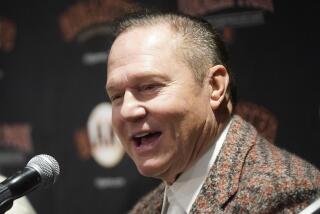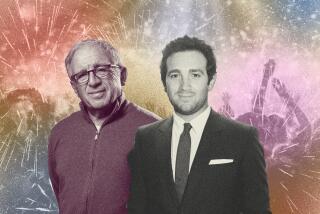He Reigns as Vicar of Agents
- Share via
In a recent compilation of “the 100 most powerful people in sports,” by the Sporting News, Mark McCormack could do no better than make the top six.
So far as I am concerned, he is all six of them.
No one stands above the sports compost the way Mark Hume McCormack does. You look at the billion-dollar business sports has become in this country, you look at the multimillion-dollar salaries and ancillary takes of the players and, if you had one man to thank (or curse), that man would be Mark McCormack. No one foresaw the television boom with more clarity and vision. No one saw the exploding commercial market in off-the-field ventures by athletes as deftly as he did.
Sooner or later, agents take over any business. They wrested Hollywood from the studios. Stars who used to be grateful to work for $2,000 a week were suddenly getting pieces of the pictures they worked in, and the take was in the millions.
As in Hollywood, “reserve” clauses began flying out the window as soon as the agents got into, so to speak, the act. As with studio moguls, sports moguls didn’t have much to say about the players any more. They simply leased them--at unheard-of fees--from the agents.
In Hollywood, MCA came to be known as the “Star-Spangled Octopus.” In sports, International Management Group--read: Mark McCormack Incorporated--had its tentacles everywhere.
You want a golfer? How about Greg Norman? Curtis Strange? Nick Faldo? Will Arnold Palmer do?
You want a tennis player? How about Ivan Lendl? Andre Agassi? Martina Navratilova? Chrissie Evert? Monica Seles? Jennifer Capriati?
How about the Pope? The Vicar of Christ on earth. Mark McCormack handled him, too.
Now, that’s big. The old Hollywood agents, the Myron Selznicks, Bert Allenbergs, even the storied Lew Wasserman, could only gape in envy.
How does Mark McCormack do it? Well, you have heard of how they called Yankee Stadium “the House That Ruth Built”? IMG is the House That Palmer Built.
Mark McCormack didn’t want to be a 10-percenter. He wanted to be--well, he wanted to be Arnold Palmer. A top golf pro.
Then, he saw the real Arnold Palmer. And he decided to go to law school instead. That was in the 1950s. Palmer was on his way to becoming the best amateur player in the country. He was playing for Wake Forest. Mark McCormack was playing for the William & Mary golf team. When McCormack saw the young Palmer hitting these long screaming one-irons out into orbit, he knew he was in the wrong line of work. He got a briefcase and a Yale law degree. Arnold Palmer ran him off the golf course--and into a million bucks. Palmer became his first--and most important--client.
Palmer put IMG in business, but IMG put Palmer into jet planes. Arnold was the first to make $100,000 on a golf course--and $1 million off it. He owned laundries, automobile dealerships, airplane agencies, golf course design companies. IMG didn’t make Palmer. Palmer made Palmer. But IMG cashed in on Palmer, and Palmer cashed in on IMG. Palmer made golf rich. IMG made Palmer rich.
It soon signed Jack Nicklaus, who later departed for his own company, and Gary Player, and shortly thereafter--with a little help from IMG handouts--the threesome became the Big Three of Golf.
Mark McCormack didn’t try to carry his clients’ business around in his hip pocket as most Mom-and-Pop agencies did at the time. He didn’t operate out of a phone booth; he operated out of a tower suite in, of all places, Cleveland. It suited Mark McCormack fine. Ninety percent of his work week was spent on a plane or on a phone anyway. Cleveland lent a nice stolidity to the conduct of the business a Palm Beach (or Palm Desert) couldn’t. Mark McCormack thought and dressed conservatively. Cleveland was reassuring.
He didn’t keep his business on a golf course. He didn’t just sign contracts and collect his fee from his star stable. His proposals were imaginative, sometimes daring. He not only branched out from Cleveland, he branched out from the United States. Within five years, he had an office in London; within seven, offices in the Orient and on the Continent. He was as international as the House of Rothschild.
He not only produced the players, he produced the tournaments. When the Royal & Ancient Golf Club in Scotland, the founding fathers of golf, needed some help with their venerable British Open, they called on McCormack. Within a year, McCormack upped their television take from $100,000 to $1 million.
McCormack not only owned golfers and tournaments, he has begun owning courses. He has always known that TV really was a wasteland without sports. He was the least surprised individual in the world when networks began throwing sackfuls of money by the billions for baseball and football contracts. McCormack saw to it the players got in on it. He has clients from all sports but prefers individual sports. “Individual sportsmen are international celebrities; team sportsmen are local celebrities,” he explains.
The Pope did not come to him on a matter of faith or morals. What had happened was, the Pontiff had made a scheduled tour of Ireland, where the Irish entrepreneurs blanketed the sites with piety items, souvenirs, booklets, umbrellas and the whole panoply of peripheral merchandising. “Some of the merchandise was schlock and embarrassing to the Church,” McCormack recalls, “but what was really embarrassing was, these guys were capitalizing on a tour which was costing the Church millions.” When the Pope toured England, McCormack saw to it that the residual income went to defray the costs of the tour and not the pockets of the hustlers. “The British press had a field day with it. They published cartoons saying, ‘Give us this day our daily dollars,’ and showed the Pope’s miter with one of those golf-shirt alligators on it.”
If they were trying to embarrass McCormack, they missed. “Mark can make a rhinoceros look like he’s about to burst into tears,” an associate once confided.
McCormack is a registered workaholic. He rises at 5:30. “How many people you know like what they do so much they can’t wait to get up in the morning to do it?” he challenges.
If Mark McCormack promises to meet you at 8 o’clock, you had better be there. At 7:59, if possible. If he says he will call you at 8:30 in the morning, the phone will ring at precisely 8:30--not 8:29, not 8:31. Not even 8:30 1/2.
He has been cited for being as cold as a ledger but he takes the position there is no room for emotion in the counting house. “That’s good,” cracks a friend, “because Mark doesn’t have any.” He is as unemotional as a dollar sign, as dispassionate as a paperhanger. He just treats life like a two-break downhill putt for all the money.
The implied impropriety of owning events and controlling the players does not shake McCormack. “Do you think anyone can force an Arnold Palmer to do something he doesn’t want to do?” he demands.
McCormack’s company, which handles Wimbledon among its other heavy-hitter events (the next Winter Olympics, the America’s Cup yachting) is moving into tennis in strength. One of his latest acquisitions is the Virginia Slims of Palm Springs tournament, which will be held at the Sonny Bono Racquet Club Feb. 25 through March 3. It is not only an IMG production, but it will star two other IMG productions, Martina Navratilova and Monica Seles.
That’s clout. Mark McCormack trails two television types and three sports commissioners in the 100-most-powerful survey. But how many of these own (a) the stars; (b) the tournaments, and (c) the sites? And besides, how many of these would be hard-put to get even an audience with the Pope? In the case of His Holiness and Mark McCormack, it was vice versa.
More to Read
Go beyond the scoreboard
Get the latest on L.A.'s teams in the daily Sports Report newsletter.
You may occasionally receive promotional content from the Los Angeles Times.










